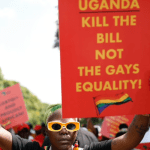Ugandan President Yoweri Museveni has signed draconian new anti-gay legislation into law, which has been supported by many in this East African country but widely condemned by rights activists and others abroad.
The version of the bill signed by President Museveni doesn’t criminalise those who identify as LGBTQ, a key concern for campaigners who condemned an earlier draft of the legislation as an egregious attack on human rights.
But the new law still prescribes the death penalty for “aggravated homosexuality,” which is defined as cases of sexual relations involving people infected with HIV as well as with minors and other categories of vulnerable people.
A suspect convicted of “attempted aggravated homosexuality” can be imprisoned for up to 14 years, according to the legislation.
Museveni had returned the bill to the national assembly in April, asking for changes that would differentiate between identifying as LGBTQ and actually engaging in homosexual acts.
This angered some lawmakers, including some who feared the president would proceed to veto the bill amid international pressure. Lawmakers passed an amended version of the bill earlier in May.
In Uganda, homosexuality was already illegaL under a colonial-era legislation that criminalized sexual activity “against the order of nature.” The penalty for that offense is life in jail.
The United States has warned of economic ramifications for legislation branded by Amnesty International as “draconian and overly broad.”
In a joint statement issued Monday, the chiefs of the UN AIDS program, the President’s Emergency Plan for AIDS Relief, and the Global Fund stated that they “are deeply concerned about the harmful impact” of the legislation on public health and the HIV response.














